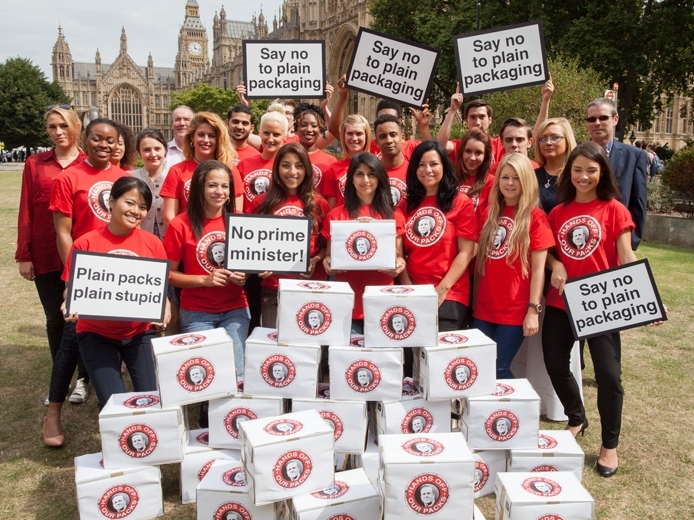At midnight last night, the Department of Health finished its final six-week consultation on whether to implement plain packaging for cigarettes. In response, Simon Clark of the Freedom Organisation for the Right to Enjoy Smoking Tobacco (FOREST) personally delivered 53,196 letters to Downing Street, with over 100,000 other people also signing a petition dissenting.
Clark said on his blog “The response demonstrates the enormous level of opposition to this ill-conceived measure. We urge the prime minister to think again.”
He added: “There’s no evidence standardised packaging will have any health benefits. Advocates base their arguments not on facts but on speculation.”
Also, in a last minute appeal, quango Public Health England (PHE) – an Executive Agency of the Department of Health – put out a press release claiming, “savings of around £500 million” in public health, a “3.4 percent fall in tobacco sales” in Australia and, more controversially, retailers “earn relatively little profit from tobacco sales. On average, only seven to nine percent of the cost of tobacco is retained by the retailer, in contrast to the government, which retains 83 percent.”
On the latter, they quote Liberal Democrat Councillor John McClurey – a newsagent – saying: “Traders like me are well aware of the tiny profit from tobacco products – I make similar profit from a pack of chewing gum as a £6 pack of cigarettes.”
Professor Kevin Fenton, National Director of Health and Wellbeing, Public Health England, added:
“Standardised packaging is a powerful measure that would help to save lives. The evidence from Australia is adding to the substantial and irrefutable case that the absence of attractive packaging works to reduce the number of smokers, as well as encouraging others to cut down.”
On tobacco not being profitable, some may point out that if going tobacco-free increases profits, then more pubs would have chosen to ban smoking before the smoking ban came in.
Even post-ban, smokers make up 38 percent of a pub’s clientele and 52 percent of profits. Indeed, Imperial Tobacco claim the average non-smoker spends £1,064 per year in a convenience store and smokers nearly double at £2,024.
It also appears that with the Tobacco Display Ban (TDB), convenience stores have had a renaissance in tobacco sales. Many supermarkets, in advance of the TDB, covered up their stores before 6 April 2012 deadline with 80 percent of small retailers reporting an increase in sales. This advantage will be lost on 6 April 2015.
The 3.4 percent reduction is challenged by Chris Snowdon, Director of Lifestyle Economics at The Institute of Economic Affairs. Smoking rates in Australia have been on the decline for decades and no statistically significant increase in quitting seems to have occurred post plain packaging.
Many would also see it as cynical at the time of the plain packs implementation there was a 12.5 percent tax hike put on cigarettes.
To the health activists, the disturbing fact is that according to the Australian National Drug Strategy Household Survey 2013, there has been a 36 percent increase in the 12-17 age groups smoking daily.
This seems bizarre in the context of public information of saturating proportions of the potential harm of smoking. One could conclude that the blanket publicity of smoking issues and the desire of teenagers not to conform are possible reasons.
For the vested interests in the tobacco industry, this has been one of the most keenly contested pieces of legislation, starting three years ago. David Cameron has been accused of being inconsistent on his decision and only a Labour Party intervention and defeat in the Lords brought it back to the Commons.
Any new legislation proposed by tobacco control and indeed other lifestyle choices such as alcohol and sugar will have to be carefully and neutrally researched. The truth, as in war, has been the first casualty and the growing unpopularity of the “nanny state” is not a label any political party seems increasingly to want to wear round its neck.

COMMENTS
Please let us know if you're having issues with commenting.